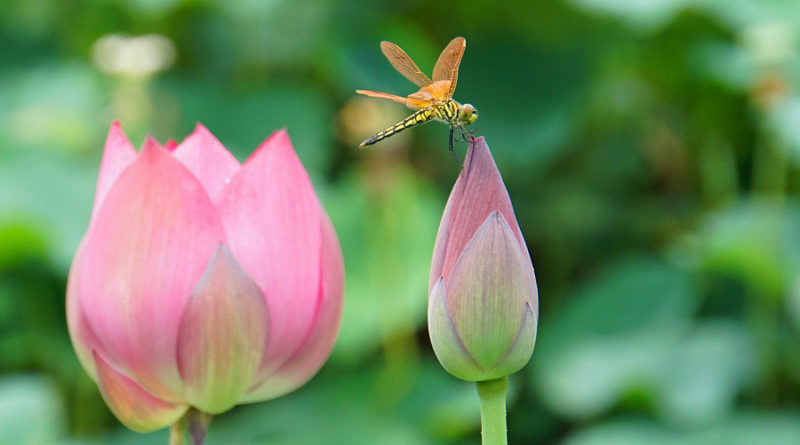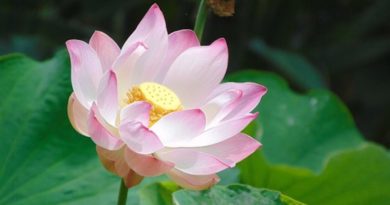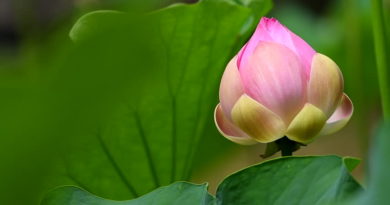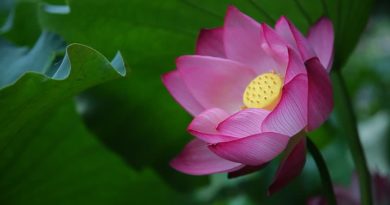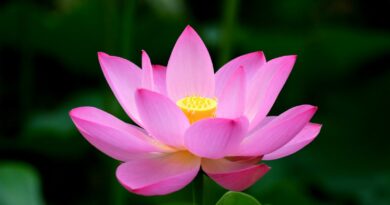DHAMMA PADETHA – 35. BE MINDFUL TO GAIN MERIT
DHAMMA PADETHA – BE MINDFUL TO GAIN MERIT
Buddhists realize the fact that kusala merit is truly dependable and demerit, akusala is their enemy. That is why they try to avoid akusala demerit as much as possible and try to gain as much merit as possible. To gain merit there are five factors:
(1) Yonisomanasik±ra – to pay proper attention
(2) Sappuris³panissaya – to get the support of virtuous people
(3) Saddhammasavan± – to be able to listen to sublime dhamma
(4) Patirupadesav±sa – to reside in a suitable locality
(5) Pubbecakatap³ñata – to have done, specially, meritorious deeds in the previous existences
(1) Yonisomanasik±ra — to pay proper attention means whether you encounter pleasant sense objects or unpleasant sense objects you must contemplate the real cause and effect, and pay proper attention by preparing your mind to stand on the good side.
When you encounter pleasant sense objects you must try not to become attached to them which is lobha. You must contemplate that because you have done good deeds in your previous lives you meet with pleasant sense objects. To be able to have good and pleasant sense objects in the future lives, till reaching nibb±na, you must not forget to do merit. If you contemplate this way, you will not be attached to the pleasant sensual objects which is lobha. Instead, you gain merit.
When you come across unpleasant sense objects too, do not have anger (dosa) and grief (domanassa). You must contemplate that because of your bad kamma you encounter unpleasant sense objects, because you have done bad deeds (akusala) in the previous lives that you meet with unpleasant things.
You can overcome these unpleasant sense objects only by doing merit. You must bear in mind that you must do merit many times more than before. If you think that way you will have no more dosa akusala, but gain merits. Therefore, yonisomanasik±ra, to pay proper attention, is one of the closest factors to gain merit.
You must have yoniso½anasik±ra, proper attention, while doing d±na merit. While you have offertories which you have earned righteously, and while there are some virtuous persons with sila to accept the offertories, you offer them. This d±na will help you throughout your sams±ra till you reach nibb±na like food packets and so on, contemplate the real cause and effect and keeping your mind on the good side is yonisomanasik±ra. It is the closest factor to gain d±na merit.
How Ashin Anuruddha-to-be reasoned …
Ashin Anuruddha-to-be was, in one existence, a poor grass carrier named Annabh±ra who stayed in rich man Sumana’s house as a dependant. While Annabhara came home carrying grass bundles through the jungle, on his way he saw Uparitha Pacceka Buddha coming for his alms-round.
Annabh±ra came home hurriedly and told his wife to | offer food for a meal. Because they had not done meritorious deeds in the previous lives they were poor. At the moment they have one meal ready, and Uparitha Pacceka Buddha to accept the food. He told his wife the true cause and effect to have yonisomanasik±ra. ‘Let us offer the food.’
(2) Sappuris³panissaya – to get the support of virtuous people means staying together with good parents and teachers. Those who stay together with good parents and teachers see them doing d±na, sila, samatha and Vipassan meritorious deeds and they also have the desire to do them, when they are able, and eventually do them. Because they receive the teachings or admonitions of parents and teachers they carry out meritorious deeds. Therefore, to have the support of virtuous people is the second factor to be able to do meritorious deeds.
(3) Saddhammasavan± – to be able to listen to the sublime dhamma means to listen to the talks on dana, sila, samatha, Vipassana etc. Dana will help you to be prosperous in every existence so that you are able to do merit continuously till you reach Nibb±na. Thus you listen to these sublime dhamma talks known as Saddhammasavan±.
Sila gives you the benefit of acquiring wealth easily, being famous with good reputation, entering functions with all kinds of audience happily without any feeling of inferiorty, seeing good signs and dying a peaceful death without any confusion and being reborn at the abode of the Celestial beings. When practising meditation you gain concentration samadhi quickly, having good health and living a long life in every existence. To listen to these is saddhammasavan±.
Samatha will lead you to the realm of brahm±. Vipassan± will lead you to the attainment of magga phala nibb±na for which you have prayed every time you do meritorious deeds. Listening to this discourse is Saddhammasavan±. Thus, to be able to listen to virtuous dhamma is the third factor to do meritorious deeds.
(4) Patirupadesav±sa – residing in a good and suitable locality. The place you stay has favourable climatic conditions, easy to acquire wealth lawfully, the sasana flourishes and the Triple Gems are respected and revered. This sort of place is Patirupadesav±sa.
Those who reside in this kind of locality are able to do d±na, sila, samatha, Vipassan± merits. Therefore, Patirupadesav±sa, residing at a good suitable place, is the fourth factor to be able to do meritorious deeds.
(5) Pubbecakatap³ñata – having done special merits in the past lives means:
You have done special merits such as d±na, sila at the Buddha, Pacceka Buddha, arahants in the past lives.
Those who have done special merits in the past lives are enthusiastic in doing merits in the present life. They are also able to do merit as expected. Therefore, pubbecakatapunnata having done special merits in the past lives is the fifth factor to be able to do meritorious deeds.
Although pubbecakatapunnata — having done special merits in the past lives — is the farthest factor in being able to do merit in the present life, yet it is the most powerful factor. Pubbecakatapunnata — having done special merits in the past lives — these people can reside at a good suitable place, (Patirupadesavasa). They could listen to virtuous dhamma (Saddhammasavana). They meet with good parents and teachers (sappurisupanissaya).
They have proper attitude in their way of thinking, take the good side and gain merit (Yonisomanasik±ra).
How the family of Buddha-to-be reasoned.
Long ago while Bramadatta king ruled over B±ranasi, the Buddha-to-be was a Brahmin by descent at Tankha village.
The Buddha-to-be lived happily together with his wife, son, daughter, daughter-in-law and a servant girl, working in the fields for their living.
One day while the Buddha-to-be and his son where ploughing the fields, his son died of snake-bite. The Buddha-to-be asked a neighbour who was passing by his field to tell his wife.
He asked the neighbour to tell his wife, unlike in the previous days, to send lunch only for one person, not to send only the servant girl but all the four to come, wearing white clothes and to bring fragrant scents. The Buddha-to-be kept his son’s corpse in the shade of a tree and waited.
As instructed by the Buddha-to-be, his wife, daughter, daughter-in-law and the servant girl, all the four came wearing white clothes and bringing scents. As they approached the Buddha-to-be sitting near his dead son’s body, none of them cried and shed tears. They contemplated death calmly. They fed the Buddha-to-be who ate seated near the corpse of his dead son.
When the Buddha-to-be had finished his lunch the five of them collected fire-wood put some scents and cremated the corpse. None of them wept. They were only contemplating the nature of death.
Because of the power of the sila of the family of the Buddha-to-be, the seat of the King of Celestials became heated. The King of the Celestials descended from his abode, stood near the family of five and asked “what are you all doing?”
They replied ‘we are cremating a person’. The King of the Celestials said ‘You are not cremating a person. I do not think so, you are roasting a deer’ “No, we are cremating a person”. “If you are cremating a person, it must be your enemy”. “Not an enemy either, we are cremating the dead son,” replied the Buddha-to-be.
“If you are cremating the dead son, it must be the son you do not love. “No, we love him very much”. “If it is a very loving son why don’t you cry” asked the King of the Celestials. Each member of the family of five gave his or her view.
Like the snake changing its skin.
The Buddha-to-be said as the snake forsakes its old skin without any attachment, my son has left his body and has gone to another life. The corpse that is left is like the old skin of the snake. It has no sensation. Though it is burnt it does not know anything. Looking at the corpse and weeping would give no benefit. That is why I do not cry.”
Came without bidding and left without permission.
The mother Brahmin said “My son came to our house from another existence without any invitation. Without our permission he has gone to another life. He came of his own accord and has gone back of his own accord. There is no benefit gained by weeping. That’s why I do not weep.”
Only Exhaustion
The big sister said “If I weep I will only grow thin and exhausted. There is no benefit whatsoever. If I cry, friends and relatives will be unhappy. There is no benefit gained in crying. That’s why I do not cry.”
Like crying for the moon.
The wife said “If I weep for my dead husband I will be like a child crying for the moon which is travelling through the space. There is no benefit gained by crying. That is why I do not cry.”
Like the broken pot that cannot he mended.
The servant girl gave her view “The dead person will not know even if we cry, neither will he be alive again. It is like a big water pot which has broken and cannot be mended. In the same way the dead will never be alive again. There is no benefit gained in crying. That is why I do not cry.”
The death of a family member, which is an unpleasant (unhappy) episode became an episode to gain merit because each member of the family of the Buddha-to-be could think fairly and justly.
Consequently, whether you encounter unpleasant incidents or pleasant incidents you must pay proper attention (yonisomanasik±ra) to get merit.

